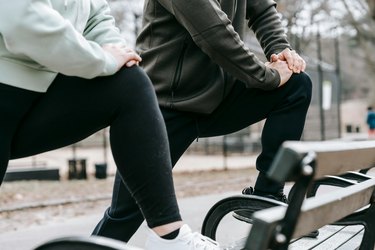
Weight gain in adulthood is generally due to a combination of what you're eating, how much (or how little) you're exercising, your genetics and other health habits like how much you sleep and how well you manage stress.
Where you store that fat — like gaining weight in your thighs and buttocks — is usually dictated by your sex assigned at birth and your hormones. Cisgender women tend to gain weight in their lower body, especially in the hips, thighs and buttocks.
Video of the Day
Video of the Day
Although you may not like the cosmetic aspects of lower-body fat, carrying weight there is preferable to carrying it deep in your belly. Deep belly fat is linked to higher chances of heart disease and type 2 diabetes.
Still, if the amount you have puts you into an unhealthy weight category according to your body mass index, waist circumference or a doctor's evaluation, you may decide to lose some fat. This can help reduce your risk for obesity-related health conditions like heart disease, type 2 diabetes, and some cancers, according to the National Heart, Lung and Blood Institute.
Remember: You can't target specific areas for fat loss. Instead, you can lose body fat all over, which may in turn change the appearance of your thighs and buttocks.
Here are some of the most common reasons for what might feel like sudden weight gain in your hips and thighs and tips to help you lose bum and thigh fat.
1. Your Estrogen Levels Are High
High levels of the sex hormone estrogen in people assigned female at birth (AFAB) can send fat to the hips, thighs and pelvis area, according to the Cleveland Clinic, making lower-body weight gain more common.
Fix It
Talk to your doctor about not just your weight gain but any other symptoms you might be experiencing that could be due to a hormonal imbalance, such as irregular periods. They might recommend lifestyle modifications, such as drinking less alcohol, or want to adjust the dosage of certain medications you're taking, such as birth control pills, according to the Cleveland Clinic.
2. You're Stressed
Stressful events have been shown to temporarily decrease your calorie burn and prompt your body to store more fat, as LIVESTRONG.com previously reported. Stress can also make you less motivated to stick to your diet and exercise goals, thereby stalling your fat-loss efforts.
Fix It
Managing stress is easier said than done, and some stress is simply unavoidable in our modern world. But it's still a smart idea to incorporate stress-busting techniques into your daily routine, such as:
- Meditation, muscle relaxation, breathing exercises or yoga
- Staying connected to loved ones
- Finding a therapist
3. You're Not Exercising Enough
If, for example, your job has you glued to your desk more often than usual, this decreased activity reduces the number of calories you burn daily. Over time, a sedentary lifestyle can lead to weight gain in your lower body (and all over).
Fix It
Work up to at least 30 minutes of moderate-intensity cardio exercise five days a week and two strength-training sessions, according to the Physical Activity Guidelines for Americans. Try to add more small movements to your days, too, such as climbing the stairs instead of using the elevator and pacing while on the phone. These tips to sit less may help, too.
4. Your Diet Could Be More Nutritious
Eating too much and/or eating less nutritious foods can contribute to weight gain all over your body, especially as you age and your metabolism slows down, according to Mount Sinai. Try to limit processed meat, sugar-sweetened drinks, alcohol and fried foods, which are all linked to weight gain.
Fix It
It may help to work with a doctor or dietitian to help you determine the best weight-loss diet for you. Generally, cutting between 500 and 1,000 calories a day is safe and can result in losing 1 to 2 pounds per week, according to the Mayo Clinic. Prioritize lean proteins and fiber-rich produce.
5. You Could Have Lipedema
Lipedema is an abnormal buildup of fat, often in the lower body, that's more common in people AFAB, according to the Cleveland Clinic. It might feel like there are small bumps under your skin or like your legs are heavy and tired. Lipedema may be related to hormonal fluctuations because it can get worse during puberty, pregnancy and menopause.
Fix It
Talk to your doctor about your symptoms. They might suggest lifestyle modifications like exercise and diet changes and wearing compression socks. Certain types of massage may help, as can liposuction or bariatric surgery, per the Cleveland Clinic.
Was this article helpful?
150 Characters Max
0/150
Thank you for sharing!
Thank you for your feedback!